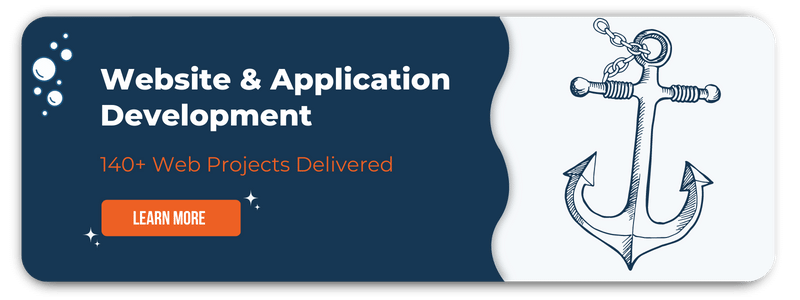
Whether it’s connecting with your support team, placing bulk orders for products, taking training courses, or accessing co-branding marketing materials, web portals can be developed to allow for every person connected to your business securely get the information and tools they need.
What is a custom web portal?
Online web portals are how we connect with a lot of our online content. Any website you have an account for, be it email, social media, business applications, or online retail sites, gives you access to a portal for that service.
How Are Web Portals Different From Websites?
Portals are different from regular website pages, as they require login credentials to access. The login credentials protect secure information, whether that’s your own personal data, proprietary data for the companies you work for or with, or customer and client data.
Portals can also give you access to tools, like instant messaging, placing or tracking orders, scheduling for meetings, deliveries, and more, or project management capabilities like task lists.
More sophisticated portals can even help connect the different aspects of your business and insight collaboration. For example, a partner directory can help one of your customers find a certified support partner in their area and connect them through instant messaging in the portal, or portal forums give partners and employees a place to ask questions and collaborate on solutions and new strategies.
Types of Web Portals
- Customer Portals
Customer and client portals help your end users with your products or services. Offering customer support through a portal, either through live chat or troubleshooting documentation, is one way to use a customer portal.
If your clients place regular orders with your business, the portal can be a good way for them to review their order history, save common items and quantities, and schedule orders.
Customers can also manage their information or accounts with your company through a portal, such as scheduling appointments with a medical provider or reviewing account information with a financial institution.
Building materials manufacturers can leverage customer portals for every customer in their channel including distributors, dealers, architects, contractors, and consumers to provide the exact tools, resources, and communications offerings each customer needs to enhance their customer experience. Some of these customers are considered partners, and that’s why partner portals serve an important role in building materials marketing and sales functions. - Partner Portals
If your business works with a network of indirect sales and distribution partners, a partner portal can give those external partners an easy way to do business with you and an easy way for you to conduct business to, through, with, and for your partners as well. The right partner portal allows them to conduct all their work with your company in one place, whether it’s managing indirect sales offerings, channel marketing campaigns, or order distribution functions. Portals are also a great place to host training and certification materials for external partners. - Internal / Employee Portal
Internal portals help connect your employees to the resources they need, and oftentimes they contain information that would have previously been stored in paper files, like client records.
These portals can be hosted either through cloud services or hosted onsite, depending on the business.
For example, if your internal portal contains private client data, like medical or banking information, an on-site server is a good choice for hosting the portal for maximum data security.
Building products manufacturers can leverage custom web portals to break down the silos between each organizational department, do example, connecting the product development, marketing, sales, and customer service teams to keep each department aligned on the needs of customers and help everyone move forward strategically together.
Broadly speaking, internal portals can also connect employees in different departments or remote teams through discussion forums, instant messaging, and secure document sharing.
Horizontal Versus Vertical Portals
Different types of web portals need different levels of functionality and accessibility from a portal user perspective.
Vertical portals are designed to be a self-service interface between the creator and the user of the portal whereby the users are given access to certain functionality and can edit or change information that will the be reflected back to the creator or another user of the portal. Managing orders is an example of this kind of vertical portal.
Horizontal portals are a good option when your objective is to amalgamate information from various sources, like displaying key performance indicators from your CRM, PRM, and ERP all into a custom dashboard built on the horizontal portal.
Custom Web Portal Cost
How much does it cost to build a customer portal, for example? You can anticipate a basic portal development to cost between $15,000 and $100,000 on average, with the price depending primarily on the following factors:
- Functionality
- Features
- Security
- Customization
- Personalization
Web Portals Examples
Custom Customer and Partner Web Portal Development Example
We have developed various user based resource portals for companies like Reaco Battery. This kind of portal allows businesses that operate using the channel distribution and indirect sales models to share documents with specific partners and indirect sales representatives.
The goal with custom partner web portal development is to create a seamless partner experience from recruiting to onboarding to customer engagement so that partners see the true value of being a part of your value chain and feel rewarded (not just compensated) for partnering with you.
Custom Internal Web Portal Development Example
Mid America's HubSpot portal has been fully customized with Custom Objects and Workflow Extensions that allow for a more detailed view of their entire channel. Through the use of these objects Mid America is able to structure their data to fit their more specific business structure. For example they are able to use a Vendor object to better visualize the relationship between their partners and customers.
Other Web Development Options
Sometimes the solution you need to sell more building materials better through channels and direct to consumers is less robust than developing a custom portal. Sometimes, you may simply need to develop a custom web application to deliver the right information to the right person at exactly the right moment in their purchase journey. We love helping with that too! Here are some examples:
Custom Web Application Development Examples
Kenyon Glass, a subsidiary of ODL, needed a way to provide accurate pricing estimates for both their customers and for partners to use when calculating pricing for their customers. We worked with them to develop a number of online pricing calculators for internal use and partner use. The various versions of this calculator are calibrated to reflect VAR pricing escalations as the products are purchased wholesale and then sold retail throughout the value chain.
The pricing calculators were more of a complex and truly custom build, but sometimes simple builds can also make a world of difference in a team’s workflow. Oxford Lab Products, for example, is using ManoByte’s PDF Generator App to provide their dealers with customized Certificates of Analysis. By installing the app directly to an existing HubSpot Portal, a company is able to both generate PDF documents of partner form submissions as well as use the form module to immediately provide custom generated PDF documents for their partners and customers right on a web page.
Looking at another example, ManoByte’s Partner Deals Portal App was created to give HubSpot users the ability to leverage their existing HubSpot portal and features as a Partner Platform without having to build out an entire PRM to gain specific functionality. This gives users the ability to allow Partners some visibility and access to their Deals as a traditional PRM would.
Another custom web app development project ManoByte conducted was for Gerald R. Ford International Airport. They needed some custom web applications built to act as inbound marketing resources and customer experience enhancement opportunities including a real time flight tracker and a non stop routes map, which have become numbered among the top trafficked pages on their website.
Web App and Portals Design and Development by ManoByte
Portals give your employees, partners, or customers access to vital functionality for your channel efforts to scale and direct revenues to grow. Whether it’s connecting with your support team, placing bulk orders for products, taking training courses, or accessing co-branding marketing materials, portals help every person connected to your business securely get the information and tools they need.

